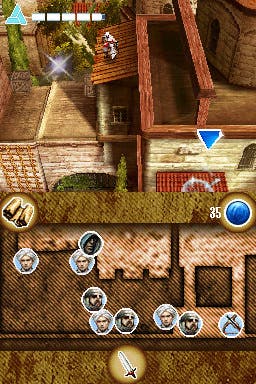Assassin's Creed: Altair's Chronicles
Al-Mualims will be cross.
If all this were done well then Altair's Chronicles would make a strong impression. What it needs is smooth movement, responsive controls and intuitive mechanics that grow in depth as the game wears on. Unfortunately this isn't the case. There's certainly a lot more at your disposal by the time the game ends - wall-jumping, bombs and daggers among your widened arsenal - but you'll rarely need to make use of them to progress, or have much opportunity to do so.
More damaging than a lack of impetus to experiment, however, are the other shortfalls: movement is not smooth, it is jerky, as is the game on the whole; controls are not particularly responsive; and, although it's far from a tricky undertaking on the regular difficulty level, there are enough occasions where signposting is weak or target platforms are situated too far off-screen that Gameloft includes an optional "hint" system that literally points you in the right direction. Elsewhere, the developer's attempt to co-opt Ubisoft Montreal's climbing-without-pressing-buttons technique backfires, particularly when you're asked to push crates and you have to edge toward them slowly until you're in exactly the right spot to latch on with the A button; a pixel too far and you just climb on top of the crate.
Death is a frequent occurrence, and far too frequently for faults not your own. Some platforms are hidden off-screen, leading to unnecessary and fatal leaps of faith. Sometimes you were meant to climb down, slink past a few guards and climb a ladder on the other side of a courtyard, but instructions to use the rooftops and seemingly reachable platforms on the mini-map confuse your progress. Altair also shuffles a bit when he lands, which is frequently enough to take him off the other side of his target platform. The near side of the screen is often a drop to the death, except when it's not. There are one-hit-kill spikes, flames and water jets that don't just blast you for poor timing but kill you for moving a pixel or two closer to them than you're allowed - fine if you were using an analogue stick, with which you could hardly blame the developer, but less acceptable on a clicky d-pad. Water, too, is fatal, except of course when it isn't.

There's also a fairly meaningless upgrade system. Every pot in the Middle East seems to contain red health orbs or blue upgrade orbs, collection of which allows you to expand your health bar or improve your sword. A bit superfluous, really. As are the fancy polygonal graphics. Plainly too much for the DS to handle, judging by the relentlessly dodgy frame-rate, they aren't even all that good. Yes it's in 3D, sort of, and Altair can do some fancy stabbing and jumping, but there are loads of missed transitional frames that spoil the fluidity of his and his enemies' actions, and the overall result isn't much better than those old 2D side-scrollers with digitised-photograph sprites from the mid-'90s, at least to our creaking eyes.
Towards the end, when you understand all its quirks, you can build up a bit of momentum and the platforming challenges graduate from awkward and thorny to reasonable and rewarding in terms of the challenge they pose. But that asks quite a lot of you, and by the time you've made that commitment the game ends. In a genre as densely (and impressively) populated as the platform game on DS, a short, prickly adventure that makes tokenistic use of the stylus strikes us as a bit disappointing. Had the game made an important contribution to the mother-game's baffling fiction, we might have thrown on another couple of marks, but it doesn't, and as a result we can only recommend it to people who've exhausted all their other platforming options and need something to tide them over until we get to learn more about Desmond Miles in Assassin's Creed 2.

